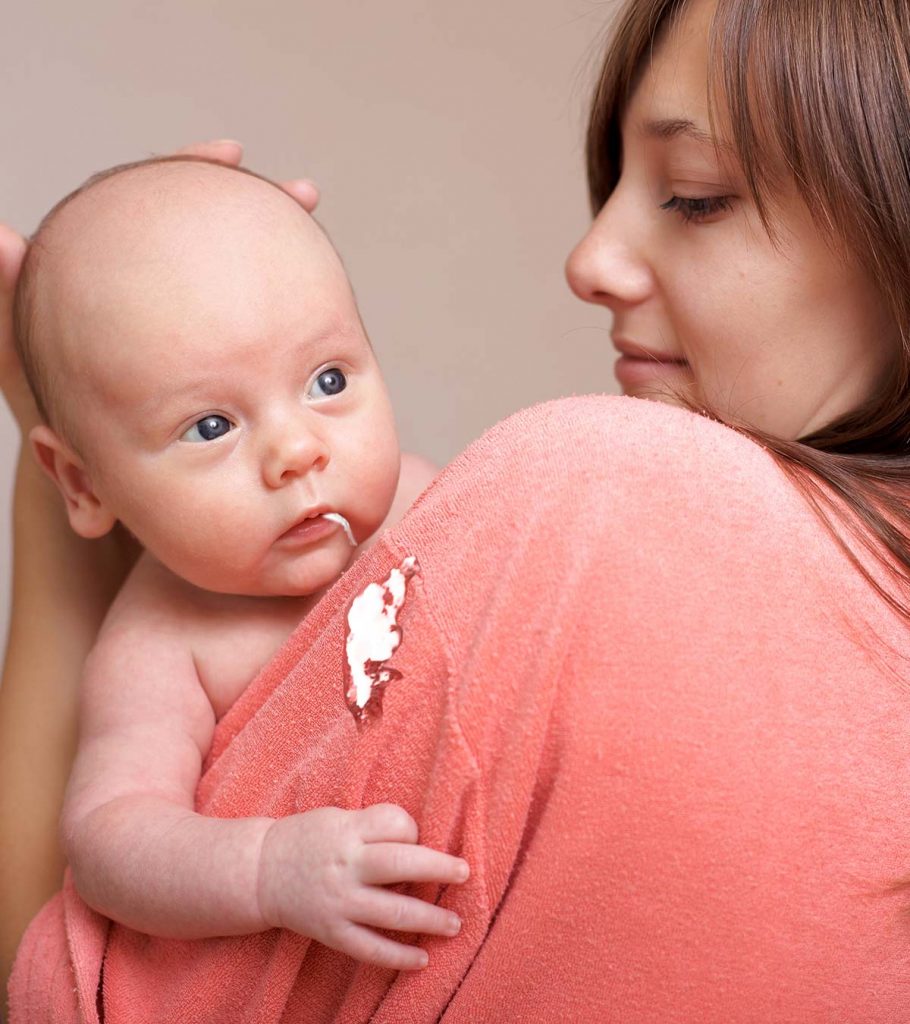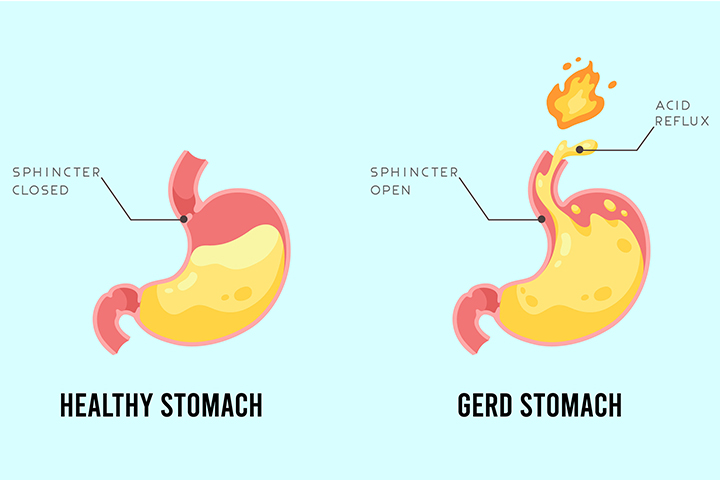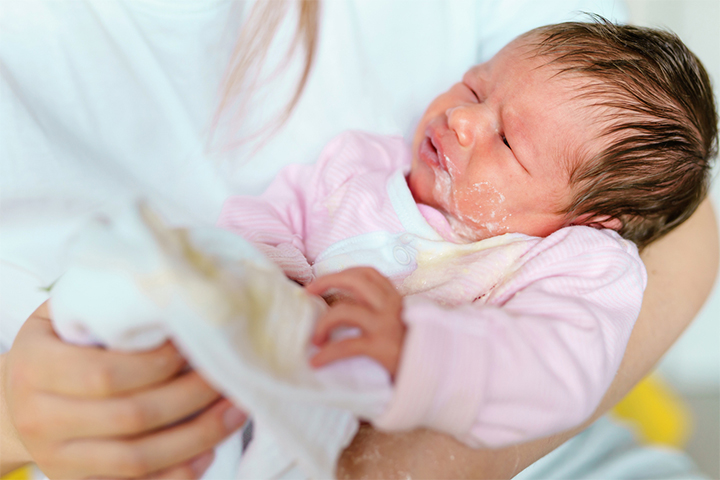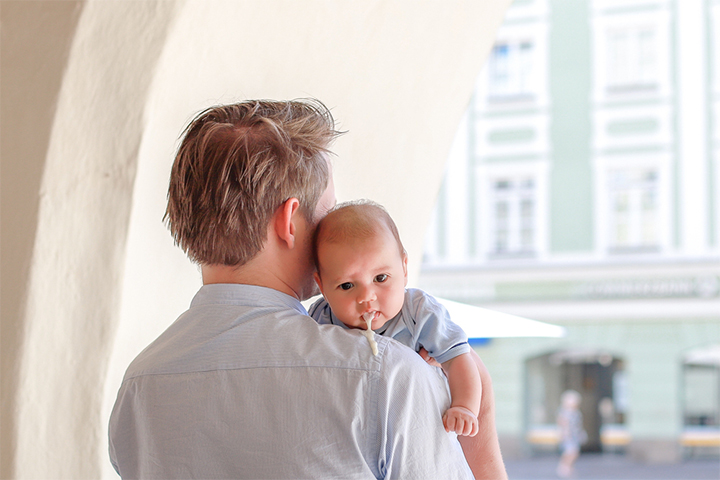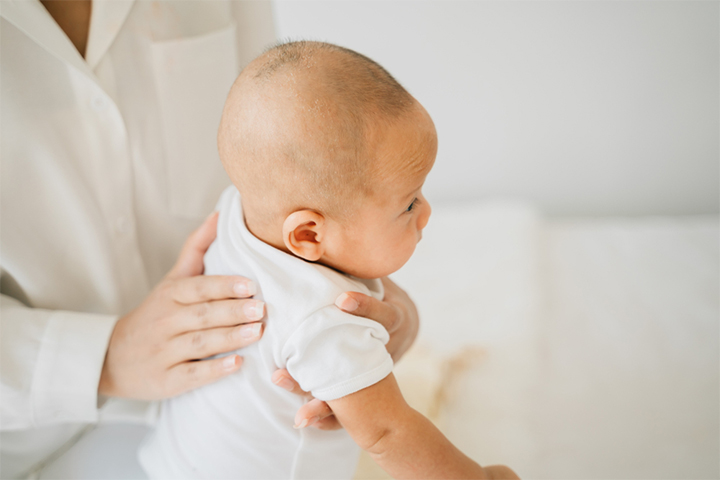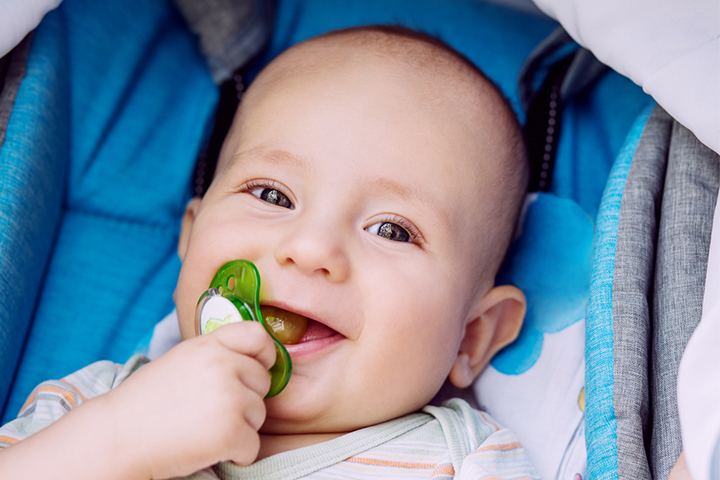When babies throw up or regurgitate milk, saliva, or food, first-time parents may feel worried and think there’s something wrong. However, spitting up is normal in babies. About half of the young babies spit up regularly. But why do babies spit up? Spitting up can occur for several reasons, most of which are benign. Babies have an immature digestive system and can throw up regardless of whether they are on breast milk or formula. Some babies may spit up more than others, but almost all babies throw up at some point during infancy. So, read on to know how spitting up differs from vomiting, what causes babies to spit up, and how you can help babies stop spitting up.
Why Do Babies Spit Up?
Partially developed junction
When we eat or drink, food passes down the esophagus or the feeding tube into your stomach. There it combines with the stomach acids or digestive enzymes and passes into the intestines where further digestion takes place. There is a junction in between the esophagus and the stomach which prevents food from going back into the food pipe.
In babies, this muscle is not fully developed and causes food to return to the feeding tube (this condition is known as infant reflux or gastroesophageal reflux disease) and causes spitting up.
Small stomach
Your baby’s stomach is too small to ingest more. At birth, your little one’s stomach will be the size of a tiny marble. In three days, it will become like a ping-pong ball but cannot hold a lot. When she is about four months old, her tummy can hold small amounts of milk. Therefore, feeding or swallowing more can push food past the valve, causing spitting up in babies. However, as your child grows, the valve also develops, and food does not travel back to the food pipe.
Burping or drooling
They often spit up when they burp or drool.
Swallowing air
Sometimes your baby may swallow air along with milk. Excessive air ingestion causes the air to get trapped and as it tries to find a way out, it brings along some liquid too.
Others causes
- They may spit up when they get too much milk too fast. This may happen when your breasts are overfull or when your baby feeds very aggressively.
- Some babies spit up more while teething or when they start eating solid foods or begin to crawl.
- It can also occur when they cry, cough, or strain themselves due to increased pressure. Infant colic can also be a reason for babies to spit up.
These reasons are not a cause of worry and they are not painful to your baby. As long as she is healthy and gains enough weight, it is a part of normal development. A healthy baby gains about six ounces in a week and requires a change of wet diapers once every six hours (1).
These reasons are not a cause of worry and they are not painful to your baby. As long as she is healthy and gains enough weight, it is a part of normal development. A healthy baby gains about six ounces in a week and requires a change of wet diapers once every six hours (1).
According to Andrew E. Mulberg, M.D, a pediatrician and pediatric gastroenterologist at the Food and Drug Administration (FDA), “Frequent spitting up is absolutely normal in most cases and not a symptom of poor health. As long as the child is alert, reasonably content, gaining weight, and not showing other signs of illness, this is not usually a cause for concern,” he says (2).
Some of the common experiences you may face with your baby’s spitting are:
- Spitting up occurs during or shortly after feedings
- Effortless spit up of one or two mouthfuls of milk or formula is normal
- Larger spit ups happen with overfeeding
- Smaller spit ups happen with burping
- Normal spit ups will not make your baby cry
- Sometimes, the milk can come out through the nose as nose and mouth are connected
Here are a few statistics you should know (not only for breastfeeding babies but all):
- Spitting up occurs soon after your baby feeds , but it may also occur after one or two hours of feeding.
- 50% of 0 to 3-month-old babies spit up at least once a day.
- Spit-ups are high at two to four months.
- Most of the babies outgrow spit-ups by seven to eight months.
- Most of the babies completely stop spit-ups by 12 months (3).
Is There A Difference Between Spitting Up And Vomiting?
Spitting up is an easy flow back of stomach contents through the esophagus out of the mouth. It does not faze most of the babies.
Vomiting is forcing the stomach contents through the esophagus, out of the mouth. If you see your baby discomfort and distressed, she is probably vomiting. It may occur soon after you feed her and brings out a greater volume of liquid than spit-ups.
Can Excess Spitting Up Affect Your Baby’s Growth?
Regular spit-up will not interfere with the well-being of your little one, as long as she is comfortable, feeds well, and gains enough weight.
It is easy to estimate how much your baby has spit-up looking at the stain size. It is usually a small portion of her feed, but appears to be more.
Baby Spitting Up Clear Liquid – Is It Normal?
Spitting up clear liquid is considered to be an ordinary occurrence.
However, there is more than one type of spit up. The most common type is watery liquid that has a few chunks of creamy white stuff. Your baby will spit up this soon after she completes feeding. It happens when she burps which brings out saliva along with partially curdled milk. Spitting up of white fluid is usually normal, but it is better to check the condition with your baby’s pediatrician to know if there are any underlying medical issues.
If it’s just the clear liquid, it might be saliva. There is no need to worry even if your baby spits up milky white liquid as it can be either breast milk or formula milk.
At times, your baby spits up an excess amount of milky stuff along with white chunks in it. It is because of the pharyngeal reflex or gag reflex development which is stimulated by the burp. It may also happen if she engages in any activity right after feeding. Also, nausea may be rare, but possible cause of spitting up milky white stuff, and in this case, you should take her to a pediatrician.
How Can You Reduce Spitting Up In Babies?
While it is not possible to prevent all spitting up, there are some ways to reduce the bouts and the frequency of spit-ups (4).
1. Hold Your Baby In Upright Position
Hold your baby uprightly while feeding her and remain in the same position for about 15 – 30 minutes even after feeding. It helps the food pass through the digestive system smoothly. Don’t feed her when she is slouching, as the path to the stomach wouldn’t be a straight one. Do not allow her to play immediately after feeding.
2. Do Not Feed When Lying Down
Do not give your baby bottle feed when she is lying down. It may cause choking and therefore, your baby may spit-up.
3. Avoid Distractions
Make sure that there is no noise or distraction when you are feeding the baby. If they are distracted, they are likely to swallow more air along with the breast milk or formula milk.
4. Nipple Hole:
If your baby is feeding through a bottle, ensure that the bottle’s nipple hole is not too small, that can frustrate your little one, and she will end up swallowing air. Also, see to it, the hole should not be too big, where she will drink too quickly ending up in spitting up the excess liquids.
5. Don’t Overfeed
Don’t overfeed your baby. If you see her spitting up after every feeding, she may be taking excess feed. Breastfeed her for a shorter time or give less formula or breast milk, and observe whether she feels full. Frequent, but lesser feeds fill the tummy sufficiently.
6. Burp Your Baby
Take some time to apply some effective burping techniques to burp your little one during and after feeding, as it can restrict air from building up in the stomach. It is natural for the baby to take a pause in between the feed, and you can avail this time to burp her. This way, if there is any air, it will come out before more food goes in. Do not worry if your baby don’t get a burp after the feed. She may not require it.
7. Do Not Put Any Pressure On The Tummy
Give your baby loose fitting clothes. Do not keep the diaper too tight. Car journey right after the feed is a big no-no since the reclining position in the car can put pressure on her tummy.
8. Put Baby To Sleep On Her Back
It is important to make your baby sleep on her back to reduce the risk of SIDS (sudden infant death syndrome) (5) . You may be worried that she may spit up when she lays on her back, but newborns will not choke when sleeping on their backs.
9. Proper Sleep Position
If your baby is likely to spit up when she is sleeping, elevate her head on the crib by placing a foam wedge beneath the mattress by about 30 degrees. It will keep her head higher than the tummy and would therefore prevent choking.
10. Make Changes In Your Diet
If you are breastfeeding, find out from your healthcare provider if there is anything in your diet that is causing your baby to spit up. Your baby’s pediatrician may tell you to avoid certain foods like dairy.
11. Limit Pacifier Use
Constant sucking through a pacifier can lead to swallowing in more air. So discourage the baby from sucking in on the pacifier for a long time.
12. Treat Cold
Cold is another cause for spitting up. If your baby is suffering from a cold, she may swallow the mucus which can make her spit-up more. You should treat her cold first to stop her from excess spitting up.
Sometimes, the above simple ways will help your baby become a happy spitter. If not, your pediatrician may suggest some medications that may help. But each has their set of benefits and risks. The pediatrician will help you find which is right for your little one.
When To Call A Doctor?
Some spitting up signs will indicate an underlying condition or a condition that is serious. You have to seek your doctor’s help if your baby is experiencing the below –
-
- Not gaining enough weight
- Spits up forcibly
- Spits up blood or any material that is like coffee ground
- Spits up brown or green fluid
- Spitting up followed by choking or coughing
- Ignores feedings repeatedly
- Starts spitting-up around six months or older
- Has less number of wet diapers than normal
- Blood in stools
- Difficulty in breathing
- Has bloated abdomen or constipation
Your doctor may offer the treatment according to the problem and its cause (6).
Exams and Tests for Spitting up in Babies
He will diagnose normal spit-ups based on physical examination and a detailed history. Blood tests and X-rays are required only in some rare cases to exclude the other serious causes.
When Does Your Baby Stop Spitting Up?
Babies usually stop spitting-up by six or seven months or once they learn to sit on their own. But few of them will continue spitting until they are one year old.
As your baby grows, her muscles develop and become stronger. This will enable the food to stay within the stomach, and stop spitting up.
It is natural to be worried about anything and everything that your baby does. But, if you are concerned about why babies spit up, then be rest assured that it is completely normal. It is a natural reflex and should disappear after your baby reaches a certain age. Although rare, if spitting up is accompanied by any other alarming symptoms such as spitting up forcefully, spitting colored fluid, or not gaining weight, you may want to consult your doctor to rule out any underlying condition. In addition, you may try some effective tips to help stop or prevent your baby from spitting.
Key Pointers
- The muscles of a baby’s stomach are not fully developed, causing food to come back up the feeding tube and result in spitting up.
- A baby’s small stomach size may cause spitting up during burping, drooling, or if they swallow air while drinking milk.
- If a baby is uncomfortable or distressed while spitting up, they may be vomiting and forcing the contents of their stomach out.
- To reduce the chances of spit up, hold the baby in an upright position, which is the right positioning during feeding. Avoid feeding while lying down, minimize distractions, avoid overfeeding, and take other precautions.
- Consult a doctor if the baby is not gaining weight, experiences forceful spitting up, refuses to eat, has bloody stool, or difficulty breathing.
Discover simple ways for dealing with spit-up and vomiting. Get practical suggestions on how to clean up and keep your baby comfortable during such incidents.
